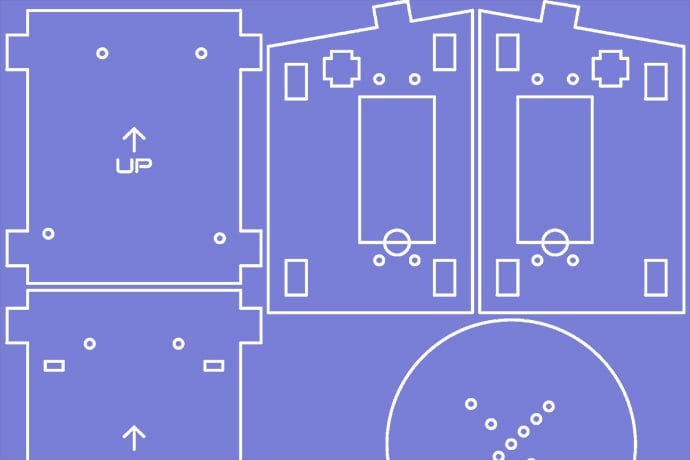Try googling ‘sumobot’ and you will likely find a range of robots capable of pushing other sumobots around in a robot sumo competition.
These fun, entry-level, bots are created for robotics competitions and usually sold for between $99 and $160. For those interested in taking a more do-it-yourself approach to robotics and hoping the keep costs down, Sumobot Jr. is a fun beginner project.

The term ‘beginner project’ likely means different things to different people. In the case of building a Sumobot Jr., ideally at least one person working on the robot will be familiar with servos and have a basic understanding of Arduino or similar microcontrollers. If not, a willingness to play around with both for a couple hours before building the robot should suffice. These robots can be wired without any soldering, and even the body can be held together with household glue.
That said, there a few steps, some of which may sound intimidating, required to purchase the parts of this bot.
This Sumobot Jr. does not come in a kit available to purchase at a maker store or even on Amazon. Instead, Nodebots created the robot body and uploaded the design to GitHub. This design document can be downloaded as-is and sent to a laser-cutting service or 3D printed. For the uninitiated this might sound overwhelming. However it basically boils down to downloading the design from one site and uploading it to another.
Makers can customize their bot by choosing various types of wood (or other material) to have it cut from, playing around with the design posted on GitHub, or simply decorating it after the robot is built.
In addition to having the robot body laser cut and shipped, there are a few more required parts:
- two continuous rotating servos are needed to make the robot wheels turn
- a microcontroller (such as Arduino) is needed to control the bot
- a small breadboard and jumper wires are used to wire it all up, a 9V battery and cap (or AA battery pack with a solderless connector) brings the bot to life

Depending on the exact materials purchased, the price tag for a complete Sumobot Jr. need not exceed $70, and could range from around $60-$80, including the microcontroller. The only tools Sumobot Jr. builders need to have on hand are sandpaper (the laser-cut parts might need a bit of sanding down in order to fit together), and a small screwdriver for the servos. Zip ties will come in handy as well.
The less technical of us can control the Sumobot Jr. using the arrows on our computer keyboard, while those who like to dabble in JavaScript can program their homemade robots. To really spruce up the sumobot, it might be fun to try out a wireless microcontroller and use bluetooth to drive your new robot.
With adult support, most children from ages 8 on up will be able to do the bulk of the making, and kids as young as 6 should be able to contribute quite a bit as well. Upper elementary students (and older) that have some background in robotics could likely complete a Sumobot Jr. independently.
As such, the Sumobot Jr. makes a fun family project, robotics camp activity, or even class project for middle school on up if funding is available.
Ready to get started? Take a look at the links below, all collected from on the makenai/sumobot-jr Github site.
Learn More
Solder-Free Sumobot
http://katiek2.github.io/sumobot-nosolder/
Sumobot Instructional Video
The video does show soldering, however this can be avoided by ordering servos with solderless connectors referred to in the list of parts linked.
https://github.com/makenai/sumobot-jr
Sumobot Jr. Design File
https://github.com/makenai/sumobot-jr/blob/master/cutting_plans/sumbotjr-3mm.eps
Solderless 4-cell Battery Holder
http://www.amazon.com/dp/B002I9V60E/ref=cm_sw_su_dp
Sumobot Additional Parts
https://github.com/norfolkjs/general-info/wiki/Norfolk.js-SumoBot-Kits
Sumobot Wiring Diagram and Setup
https://github.com/makenai/sumobot-jr
A 3D Printing Option
http://www.thingiverse.com/thing:357369
Ponko Laser Cutting Service
Expect the laser cutting and shipping to come to between $10.00-$20.00 depending on the material you choose.
https://www.ponoko.com/

